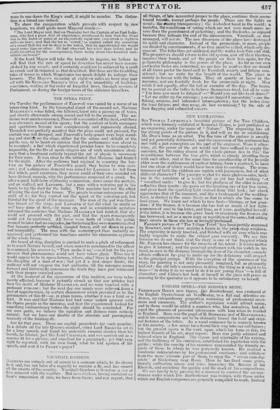THE OPERA FEINT.
ON Tuesday the. performance of Taneredi was varied by a scene of an interesting kind. In the triumphal chant of the second act, Madame MALIBRAN'S voice failed, she falteked, burst into a paroxysm of tears, and shortly afterwards . swung round and fell to the ground: • The au- dience were much concerned, Taneredi was carried off the field, and there was obviously an end of the opera ; but the conduct. of both managers and spectators 'became now conspicuously and ingeniously absurd. Though it was perfectly manifest that the piece could not proceed, the curtain was not dropped, and Tanerede s body-guard were kept stand- ing and starift on the stage, either for the solace and delight of the public eye, or to beget an opinion that the performance was about to be resumed ; a fact which experienced persons knew to be completely impossible, for the fits of opera-singers are of such uncommon obsti- nacy that a treatent entirely beyond the art of physic is necessary for their cure. It' was clear to the initiated that Madame had fainted for the night. After the audience had rejoiced in counting the but- tons on the gaiters of Tancredi's guard, they began to wax curi- ous ; and a clamorous demand was raised for LAPORTE to tell them that which, good creatures, they never coUld of their own unaided wit have divined, namely, why the performance remained at a stand. So, after a good half-hour of pleasing commotion, down came the curtain, and on walked, not LAPORTE, but a man with a watering-pot in his hand, to lay the dust for the ballet. This machine had not the effect of laying the dust in the house. The people became outrageous at the sight of it ; for they wanted not the spout of the watering-pot, but thirsted for the spout of the manager. The man of the pot was there- fore hissed oft' the stage, and LAPORTE at last did what lie might as well have done at firse—he came on, and in considerable agitation informed the audience that Madame Mmaurtaer. had fainted, that she could not proceed with the part, and that the orera consequently could not be continued. All thes.e were facts of which the public seemed to have had no suspictiOn,fortheinstantthey were dorrimfinicated they became perfectly satisfied, shouted 'bravo, and sat 'down in peace and tranquillity. The man with the watering-pot then instantly re- appeared, and performed his functions amidst the clamorous applause
of the whole house. •
On board of ship, 'discipline is earned to such a pitch of refinement as to reach Nature lierself,end when sunset is announced to the officer in command, his answer is, " Then make it so,"—as if but for his per- mission that phenomenon could not have taken place. Thus too it would appear to be in opera-housee, where, alas! there is anything but the discipline of a man of war ; but yet if a first singer faints, the audience will not 'suppoSe the fact authentic till the manager comes forward and historically announces the truth they have just witnessed with their proper outward eyes. At the moment of the occurrence of this incident, we were vehe- mently affected, because it instantly struck us that our articles had been the death of Madame MALIBRAN, and we were touched with a profound remorse ; but the next day our minds were relievesiefrom
load of apprehension, by certain dikussions which prevailed as to the genuineness of this fit—or, in plain terms, whether it was a faint or a feint. It was said that Madame had had sonic violent quarrel with the Opera people in the morning, and that the experienced looked for something extraordinary before the night should be concluded. • For our own parts, we believe the agitation and distress were entirely natural; but we have our doubts of the absolute and peremptory necessity of the fainting-fit.
But let that pass. There are capital precedents for such practice. In a debate on the late Queen's conduct, when Lord ERSKINE set in for a long speech, and found his materials running shorter than his breath, he fainted, just like Lord CHATHA3I, and was carried out in a manner fit for a picture, and excellent for a paragraph ; yet t it.tk Very night he reported, with his own hand, what he had spoken of his speech, and sent it to Pealav-s paper !


















 Previous page
Previous page